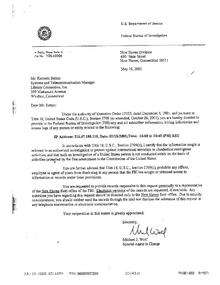Doe v. Gonzales

John Doe v. Alberto R. Gonzales, was a case in which the American Civil Liberties Union (ACLU), along with the Library Connection and some librarians, challenged Section 2709 of the Patriot Act.
Facts
John Doe was the recipient of a National Security Letter (NSL) that requested all information associated with one of his Connecticut library’s computers. § 2709 imposed a gag order on the recipients so they could neither inform anyone of receiving the letter, nor act as witnesses.[1]
Rulings
In September 2004, Judge Victor Marrero of the United States District Court for the Southern District of New York struck down the NSL provisions of the USA PATRIOT Act.[2] The government appealed the case to the United States Court of Appeals for the Second Circuit.[3]
Justice Ruth Bader Ginsburg, a Justice of the Supreme Court of the United States, acted as a single Circuit Justice for this case. She ruled against vacating the stay imposed by the Court of Appeals of the Second Circuit upon the Federal District Court’s preliminary injunction.[4][5][6] Ginsburg said that the Court should hesitate to interfere with an appeals court that was proceeding on an expedited schedule to review a ruling against a federal law, and that, in any event, the Court should be cautious when such a law had been nullified in a lower court.[7] Nearly a year later, the government dropped its demands and allowed the release of the NSL. The ACLU and Library Connection hailed the government’s withdrawal as a victory for all library users who valued their privacy.[8] The case was dismissed as moot.[9]
The New York Civil Liberties Union (NYCLU) and ACLU returned to court in the Southern District of New York on Aug. 15, 2007, arguing that the amended law was unconstitutional because it impermissibly narrowed judicial authority in violation of the separation-of-powers principle and the First Amendment. Judge Marrero agreed and struck down the NSL provision of the amended law. The government appealed the decision in the Second Circuit. On March 19, 2008, the ACLU and the Electronic Frontier Foundation (EFF) filed Amicus briefs[10] at the Second Circuit Court of Appeals arguing that the modifications made in the 2007 USA PATRIOT act are unconstitutional and should be struck down.[11] Oral argument was heard on August 27, 2008. This case was originally filed as Doe v. Ashcroft.
Effects
The librarians were awarded the 2005 Robert B. Downs Intellectual Freedom Award, by the American Library Association.[12]
Notes
- ↑ "Archived copy" (PDF). Archived from the original (PDF) on 2010-05-27. Retrieved 2010-11-01.
- ↑ https://www.aclu.org/national-security/librarians-speak-out-first-time-after-being-gagged-patriot-act
- ↑ "Judges Question Patriot Act in Library and Internet Case". The New York Times. 2005-11-03.
- ↑ Doe v. Gonzales, 546 U.S. 1301 (2005).
- ↑ "Archived copy". Archived from the original on 2004-10-16. Retrieved 2010-01-24./news.aspx?id=15904&SearchString=doe_v._gonzales
- ↑ Ginsburg, Ruth Bader (October 7, 2005). "Doe v. Gonzales, 546 U.S. 1301, 1308–1309 (2005), Docket No. No. 05A295" (PDF). United States Supreme Court. Retrieved 15 December 2012.
- ↑ Denniston, Lyle (14 December 2012). "Detention law challenge fails". SCOTUSBlog. Retrieved 15 December 2012.
- ↑ "Government Drops Demand for Library Records". Retrieved 2010-09-05.
- ↑ http://federalism.typepad.com/crime_federalism/2006/05/doe_v_gonzalez_.html
- ↑ "Doe v. Mukasey (Doe v. Gonzalez, Doe v. Ashcroft) | Electronic Frontier Foundation". Eff.org. Retrieved 2010-09-05.
- ↑ "EFF Urges Court to Rule National Security Letters Unconstitutional | Electronic Frontier Foundation". Eff.org. 2008-03-20. Retrieved 2010-09-05.
- ↑ "Archived copy". Archived from the original on 2012-07-28. Retrieved 2010-11-01.
External links
- "Doe v. Holder : Internet Service Provider's NSL", ACLU
- "USA PATRIOT Act: Doe v. Gonzales", American Library Association
- Doe v. Gonzales: Fighting the FBI's Demand for Library Records – Statement of George Christian
- Doe v. Gonzales: Fighting the FBI's Demand for Library Records – Statement of Barbara Bailey
- THOUGHTS FROM A LIBRARY ADMINISTRATOR
- US District Court Connecticut 090905 JCH.Doe
- Jameel Jaffer testimony, National Security Letter Reforn Act, April 15, 2008
- PAUL SIEGEL (2007). COMMUNICATION LAW IN AMERICA. paul siegel. ISBN 978-0-7425-5387-3.